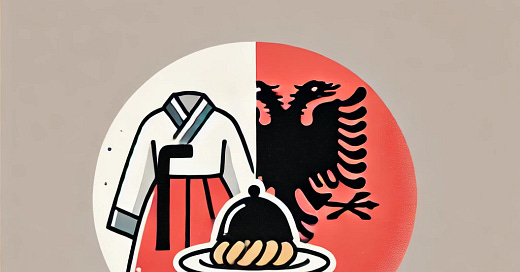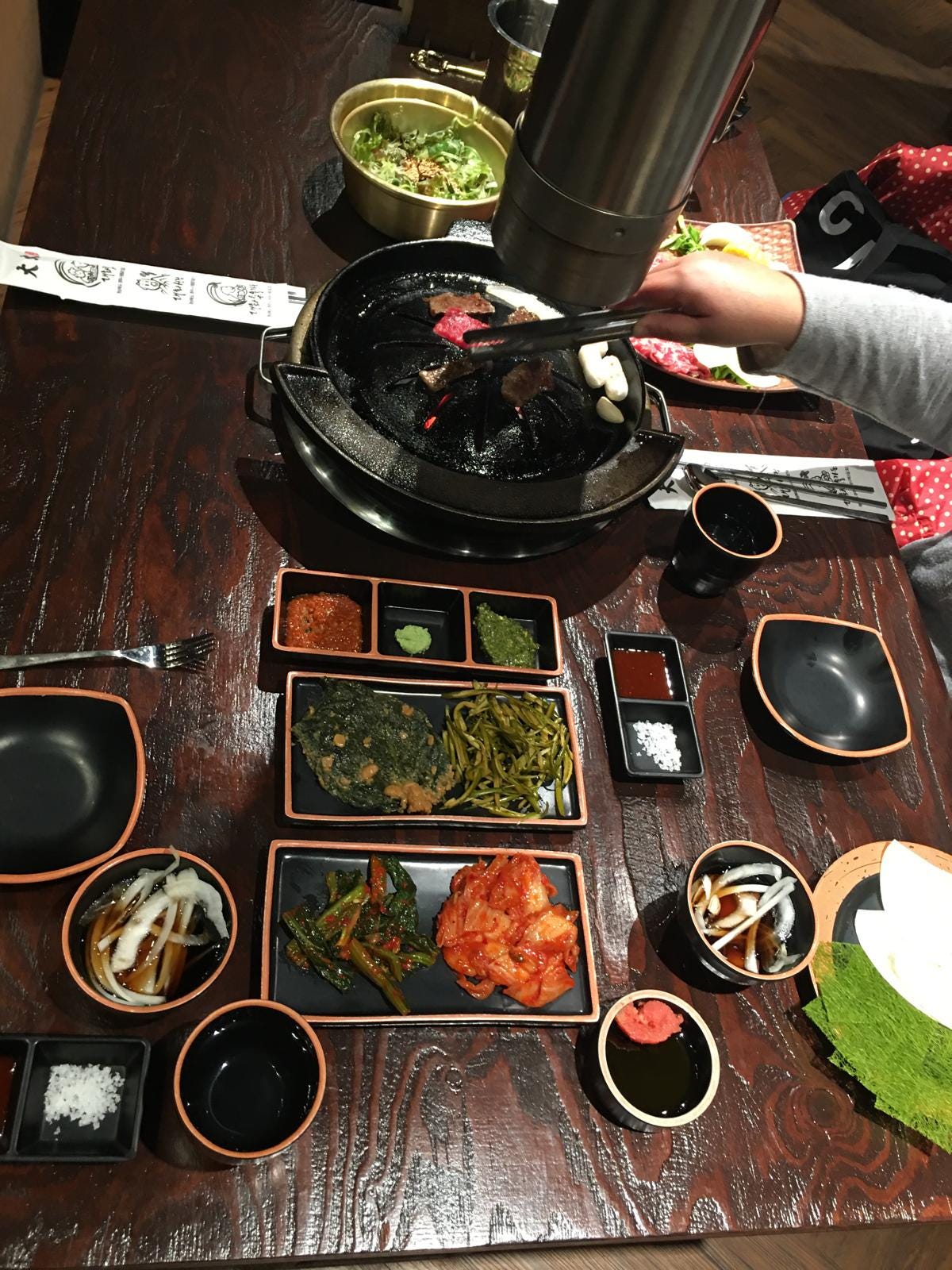Byrek and Bulgogi: Confessions of an Albanian K-culture addict.
Lost in Translation? More like found in countless similarities – An Albanian's love letter to Korean culture.
Let me tell you something funny – there's an Albanian woman (that's me, Redina!) sitting in my home during the Covid lockdowns, eating byrek while watching Korean dramas, and suddenly realising that Koreans and Albanians might be long-lost cousins.
No, please, hear me out!
The respect game is strong in both cultures
First time I watched a K-drama and saw someone bowing politely, I had flashbacks of my grandmother scolding me: "Redina, why aren't you greeting auntie Lena properly?" We Albanians may not bow, but oh boy, do we have our elaborate respect rituals. Try leaving an Albanian house when an aunt or uncle insists you should stay for lunch or dinner. I dare you.
The Korean "nunchi" (reading the room and showing social awareness)?
We Albanians have been doing that since forever too! We call it "ki mendjen, sillu mire" (pay attention to others, behave well), and believe me, every Albanian mother or grandmother has a sixth sense for detecting when you're not reading the room correctly.
Family drama: The universal language
When I first saw a Korean mother-in-law in The Birth of a Beauty giving her daughter-in-law a hard time, I nearly spat out my coffee. Switch the hanbok for traditional Albanian dress, and you've got my aunt Vjollca critiquing her daughter-in-law's pie-making technique!
"Oh, look, those pastry layers aren't thin enough," they say, from Seoul to Saranda.
And don't even get me started on family gatherings. Koreans have Chuseok, we have Viti i Ri (New Year’s Day celebrations). Different names, same energy: too much food, endless relatives coming and going, and that one aunt asking you why you're still single. "Redina, why are you watching those Korean shows instead of finding a nice Albanian man?" Yes, auntie, because Ji Hyun Woo exists, thank you very much.
Food as medicine … Food as love …
People in both cultures believe food can cure anything. Koreans have their samgyetang (that’s ginseng chicken soup) which can restore anyone to good health; we have our version of chicken soup with noodles and lemon zest that cures everything from a common cold to an existential crisis.
My mother's response to any problem is "Have you eaten?" or “Make sure you eat well and don’t skip meals” which I recently learned is exactly what Korean moms say too!
And the sharing food culture? When I saw how family members in Reply 1988 sat around a low table and ate from the same pot, I thought to myself, “Wait, that’s us with our fergese or terhan (traditional Albanian foods).” The only difference is we fight over the last piece with forks instead of chopsticks.
The sacred art of making and (drinking) tea …
Koreans have their elaborate tea ceremonies, and Albanians... well, we have our tea drinking traditions too. Probably right now your typical Albanian grandmother is climbing up a rugged mountain path, not for the adrenaline rush, but because she spotted some of that precious “çaj mali” (mountain tea) growing in some inconvenient spot.
She will harvest those pale, fragrant green stems and dry them in traditional ways. Then, she will store the tea leaves carefully in clean jam jars. So, any time you have got a headache, a broken heart, or a problem at work, she can offer you the same solution and consolation: a cup of freshly boiled, fragrant mountain tea.
We have drama in our DNA
You know those dramatic scenes in K-dramas where someone's pouring their heart out in the rain under a yellow umbrella or when a father is shouting at his son in the living room?
Switch the rain for a Balkan thunderstorm, and you've got Albanian love stories and family arguments. We're just as dramatic and loud as Koreans, only with more hand gestures and occasional references to what your mother said about someone's cousin in 1987.
The heart of the matter
But perhaps the most profound similarity is our fierce pride in our cultural heritage. Koreans have "uri nara" (our country, our nation), and we Albanians speak of our homeland with the same passionate devotion.
Looking at both cultures side by side, I can't help but smile at my checklist:
Strict parents? Check.
Meddling relatives? Check.
Drama in the rain? Check.
Food as a love language? Double-check
So here I am, an Albanian woman who's found her spiritual second home in Korean culture.
Your turn to share
What about you? Whether you've found yourself nodding along to these similarities or have your unique cultural connection to Korea, I'd love to hear your story. What elements of Korean culture remind you of your heritage? Or what drew you into the wonderful world of K-culture in the first place?
Share your story in the comments below – after all, discovering these cultural bridges is what makes our global community so fascinating!
+++++++++++++++++++++++++++++++++++++++++++
Redina is a self-proclaimed K-drama expert who will tell you the whole plot of "Crash Landing on You" while making the perfect byrek (Albanian pie). She's still working on convincing her family that a pinch of Gochugaru would greatly enhance the flavours of tavë kosi (Albanian lamb stew).






I loved reading this. 💖 Those meddling aunties are everywhere it seems!